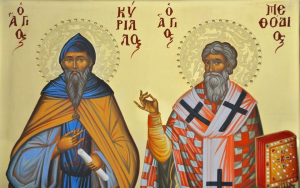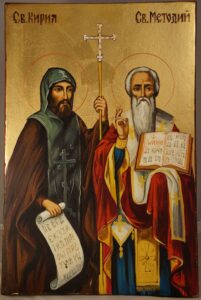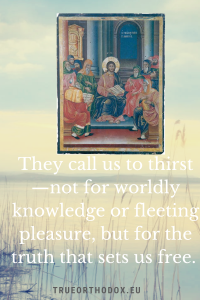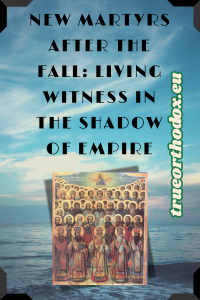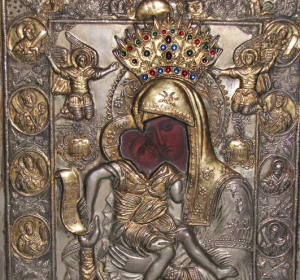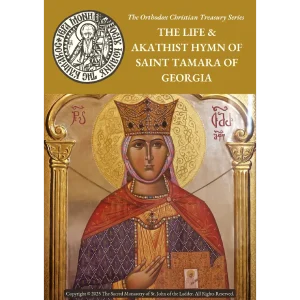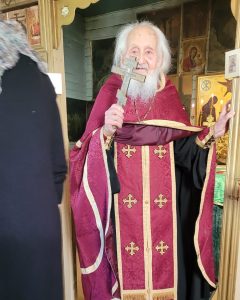Concerning Chiliasm
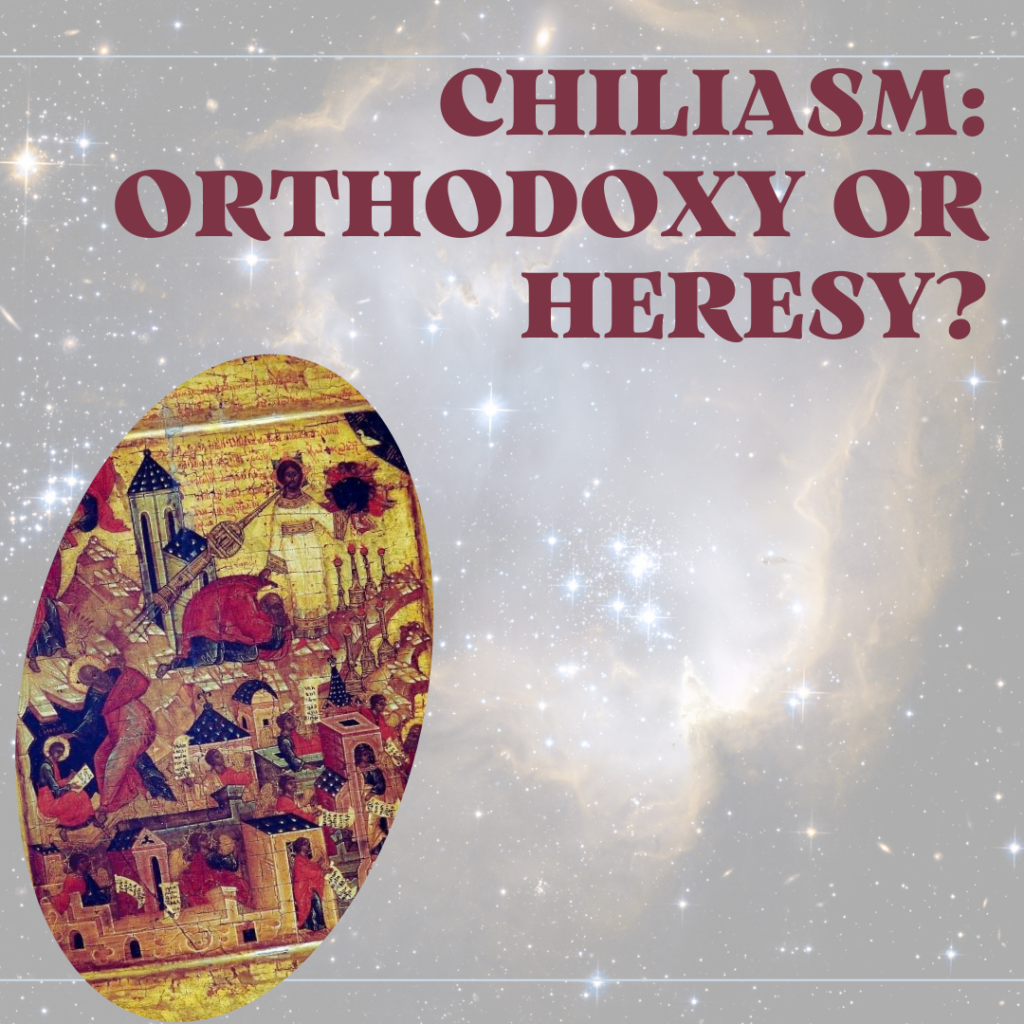
+ Bishop Philaretos
And I saw an angel coming down out of the heaven, having the key of the abyss and a great chain upon his hand. And he laid hold of the dragon, the serpent, the ancient one, who is the Devil and Satan, the one leading astray the inhabited world, and bound him for a thousand years; and he cast him into the abyss, and locked and closed it with a seal over him, in order that he may not lead astray the nations any longer until the thousand years should be finished; after these things, it is necessary for him to be loosed for a little time. And I saw thrones, and they sat on them, and judgment was given to them, and I saw the souls of those having been beheaded on account of the testimony of Jesus and on account of the word of God, and who neither made obeisance to the beast nor his image and did not receive the mark on their forehead and on their hand; and they lived and reigned with Christ for a thousand years. And the rest of the dead did not live until the thousand years should be finished. This is the resurrection, the first one. Happy and holy is the one having part in the resurrection, the first one. Over these, the second death hath no authority, but they shall be priests of God and of the Christ, and shall reign with Him for a thousand years (Revelation 20:1-6).
Chiliasm, from the Greek word chilia (χίλια), or Millenarianism from the Latin words mille, “a thousand,” and annus, “year” describes a belief wrongly based on Revelation 20:1-6 that there will be a golden age or paradise on earth for a thousand years when Christ will reign before the Final Judgement. According to this theory, there will be peace and prosperity for all the living righteous and those that will have been raised from the dead for this purpose.
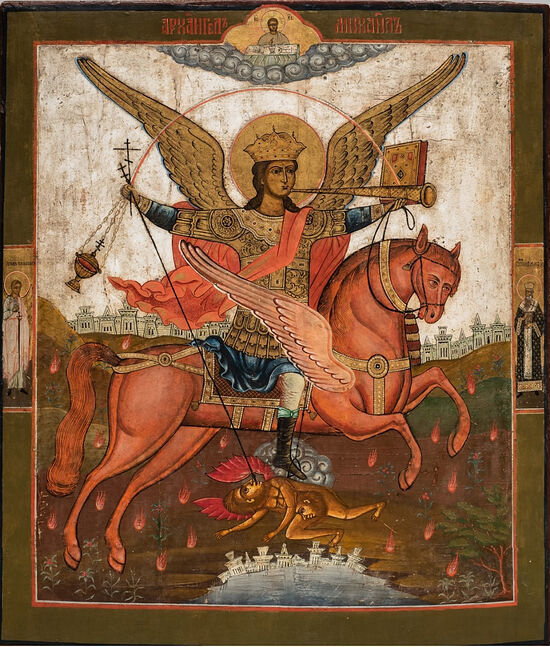
We will not be discussing heretical sects that are known also as Chiliasts such as the “Jehovah’s Witnesses” or the Adventists, but rather we will discuss Chiliasm in the history of the Orthodox Church.
The idea of Chiliasm can be first noted from the uprising of Judaic messianism, in which the Jews were awaiting a Messiah who would establish a thousand year kingdom with Jerusalem as its center, which all the people of the world would be subjected to.
The Jews, for the most part, rejected Christ because He didn’t fit their earthly expectation of the Kingdom of God. Christ Himself responds to Pontius Pilate saying, “My kingdom is not of this world: if my kingdom were of this world, then would my servants fight, that I should not be delivered to the Jews: but now is my kingdom not from hence” (John 18:36).
The central belief of Chiliasm stems from a misinterpretation of Revelation Chapter 20. We must first of all note that there was a certain amount of hesitation in the early Church concerning the inclusion of the Book of Revelation in the canonical scriptures of the New Testament. This hesitation was due to the fact that the Book of Revelation is expressed totally in allegorical imagery and symbols, which could easily be misinterpreted. For this very reason, the Book of Revelation is never liturgically read in the Orthodox Church.
The Holy Gospel, however, speaks much more clearly for all to understand. Therefore, let us examine the end times from what Christ Himself says about them in the Holy Gospels.
Chapter 24 of the Gospel according to St. Matthew and Chapter 13 of the Holy Gospel according to St. Mark basically state the same thing. In these two chapters, our Lord, God, and Savior Jesus Christ tells us:
‘And as He sat upon the Mount of Olives, His disciples came to Him privately, saying, Tell us, when shall these things be, and what shall be the sign of Thy coming, and of the completion of the age?” And Jesus answered and said to them, Be taking heed, lest anyone lead you astray. For many shall come in My name, saying, ‘I am the Christ; and they shall lead astray many. But ye are going to hear of wars and rumors of wars; keep on looking out and cease being clamorous; for all these things must come to pass, but the end is not yet. For nation shall be stirred up against nation, and kingdom against kingdom. And there shall be famines, and plagues, and earthquakes, in place after place. But all these are a beginning of birth pangs. Then they shall deliver you up to affliction, and shall kill you, and ye shall be hated by all the nations for My name’s sake. And then many shall be made to stumble and shall deliver up one another, and shall hate one another. And many false prophets shall be raised up and shall lead astray many. And because lawlessness shall have been multiplied, the love of the multitude shall grow cold. But the one who endureth to the end, this one shall be saved. And this Gospel of the kingdom shall be proclaimed in all the inhabited world, for a testimony to all the nations; and then shall the end come. Whenever ye, therefore, see ‘the abomination of the desolation,’ which was spoken of by Daniel the prophet, standing in the holy place”—the one who readeth, let him understand— “then let those in Judæa flee to the mountains. The one on the housetop, let him not come down to take away anything out of his house. And the one in the field, let him not return back to take up his clothes. And woe to those who are with child and to those who give suck in those days. But be praying that your flight might not take place in winter, neither on a sabbath. For then there shall be great affliction, such as hath not been from the beginning of the world until the present, no, nor ever shall be. And if those days were not shortened, no flesh would be saved; but for the elect’s sake, those days shall be shortened. Then if anyone should say to you, ‘Behold, here is the Christ,’ or ‘Here,’ do not begin to believe it. For false christs and false prophets shall be raised up, and they shall produce great signs and wonders, so as to lead astray, if possible, even the elect. Behold, I have told you beforehand. If then they should say to you, ‘Behold, He is in the desert,’ do not begin to go forth; ‘Behold, He is in the secret chambers,’ do not begin to believe it. For even as the lightning cometh forth from the east and appeareth as far as the west, so also shall be the coming of the Son of Man. For wheresoever the corpse may be, there will the eagles be gathered together.”
“And straightway after the affliction of those days shall the sun be darkened, and the moon shall not give her light, and the stars shall fall from the heaven, and the powers of the heavens shall be shaken. And then shall the sign of the Son of Man appear in the heaven, and then the tribes of the earth shall mourn, and they shall see the Son of Man coming on the clouds of the heaven with power and great glory. And He shall send forth His angels with a great sound of a trumpet, and they shall gather together His elect from the four winds, from the uttermost parts of the heavens unto their extremities… But concerning that day and hour, no one knoweth, not even the angels of the heavens, except My Father only. But even as the days of Noah were, so also shall be the coming of the Son of Man. For even as in the days which were before the flood, they were eating and drinking, marrying and giving in marriage, until the day that Noah entered into the ark— and they knew not until the flood came and took all away—so also shall be the coming of the Son of Man. Then two shall be in the field: the one is taken and the one is left. Two women shall be grinding at the mill: one is taken and one is left. Be watching then, for ye know not in what hour your Lord cometh. But know ye this, that if the master of the house had known in what watch the thief was coming, he would have watched and not let his house be broken into. On this account, ye also keep on becoming ready, for in what hour ye think not, the Son of Man cometh. Who then is the faithful and prudent slave, whom his lord appointeth over his household, to give them food in due season? Happy is that slave whom his lord, after he cometh, shall find so doing. Verily I say to you, that he shall appoint him over all his possessions. But if that evil slave should say in his heart, ‘My lord taketh time to come,’ and should himself begin to strike his fellow slaves, and to eat and to drink with the drunken, the lord of that slave shall come in a day in which he expecteth not, and in an hour in which he knoweth not, and will cut him in twain, and will place his portion with the hypocrites. There shall be there the weeping and the gnashing of the teeth”’ (Matthew 24:3-31, 36-51).
From this passage, we can clearly see that when our Lord Jesus Christ suddenly and unexpectedly comes, it will not be to reign on earth for 1000 years, but rather to judge immediately both the living and the dead. The Kingdom of Christ is none other than His eternal Kingdom – not a Kingdom on earth for only 1000 years. Christ tells His Holy Apostles, “in My Father’s house are many abodes; otherwise, I would have told you. I go to prepare a place for you. And if I go and prepare a place for you, again I am coming and will receive you to Myself, that where I am ye may be also. And where I go ye know, and the way ye know” (St. John 17:2-4).
Christ’s words to the Good Thief make the nature of His Kingdom clear:
‘And he was saying to Jesus, “Remember me, O Lord, when Thou comest in Thy kingdom.” And Jesus said to him, “Verily I say to thee, today thou shalt be with Me in Paradise”’ (St. Luke 23:42-43).
Doesn’t the concept that Christ will literally reign with the righteous for 1000 years on earth conflict with the fact that Christ is truly with us as He says in Matthew Chapter 28?
‘And Jesus approached and spoke to them, saying, “All authority is given to Me in heaven and on earth. Go therefore and make disciples of all the nations, baptizing them in the name of the Father, and of the Son, and of the Holy Spirit, teaching them to observe all things whatsoever I commanded you; and behold, I am with you all the days until the completion of the age”’ (St. Matthew 28:18-20).
And what about the Gospel of St. Luke when it says, ‘and having been questioned by the Pharisees when the kingdom of God is coming, He answered them and said, “The kingdom of God cometh not with observation; nor shall they say, ‘Behold, here!’ or ‘Behold, there!’ For behold, the kingdom of God is within you.” And He said to the disciples, “The days will come when ye shall desire to see one of the days of the Son of Man, and ye shall not see it’ (St. Luke 17:20-22).
The Gospels and the Creed speak about two comings of our Lord and Savior Jesus Christ. The first starting from the time of His Incarnation and ending with His Holy Ascension, and the second when He “shall come again with glory to judge both the living and the dead; Whose Kingdom shall have no end” (Nicene Creed). Therefore, the Kingdom is not something that we await in the future but something that has already begun.
In the Epistle reading for the dead, we read “For the Lord Himself shall descend from heaven with a shout of command, with a voice of an archangel, and with a trumpet of God; and the dead in Christ shall rise first. Then we the living, the ones remaining over, shall be carried off together with them in clouds to a meeting of the Lord in the air, and so shall we always be with the Lord.” (1 Thessalonians 4:16-17). In this reading, we clearly see that once we are with the Lord in the end times, we shall be with Him forever.
And the Prophet Daniel tells us “many of them that sleep in the dust of the earth shall awake, some to everlasting life, and some to reproach and everlasting shame” (Daniel 12:2). This is the one awakening at the final judgement.
We believe in Christ’s present reign over all things from heaven and that His Saints are already with Him (Luke 23:42-43; John 14:2-4; 17:24; Phil. 1:22-23; 2 Cor. 5:6-8). We therefore cannot believe in a future, limited, and provisional kingdom on earth where perfection mingles once again with imperfection, but we only await (Rom. 8:21; 1 Cor. 13:10) the replacement of the present heaven and earth with a heaven and earth in which righteousness dwells (2 Pet. 3:13; Rev. 21-22).
St. Peter often refers to the day of the coming of the Lord as a day of destruction of the earth as we know it now. “But the day of the Lord shall come as a thief in the night, in which the heavens shall pass away with a rushing sound, and the elements, being burned with intense heat, shall be dissolved; and the earth and the works in it shall be burned completely” (2 Peter 3:10). And again, ‘but concerning the times and the seasons, brethren, ye have no need for me to be writing to you; for ye yourselves know perfectly that the day of the Lord so cometh as a thief at night. For whenever they say, “Peace and security,” then sudden destruction standeth over them, even as the pangs of childbirth to her who is with child; and in no wise shall they escape. But ye, brethren, are not in darkness, that the day should overtake you as a thief’ (1 Thessalonians 5:1-4).
Scripture does not foresee a resurrection of only the just, as can be seen in Acts 24:15, “that there is about to be a resurrection of the dead, both of the just and the unjust.” The righteous who have fallen asleep in the Lord are alive in Christ and are already participating with their King and High Priest in the priestly kingdom in heaven.
In a nutshell, the Kingdom of God already exists as symbolically portrayed by the thousand years in Revelation Chapter 20 and is as the Prophet Daniel says, ”And to him was given the dominion, and the honour, and the kingdom; and all nations, tribes, and languages, shall serve him: his dominion is an everlasting dominion, which shall not pass away, and his kingdom shall not be destroyed” (Daniel 7:14). The number 1000 is used exclusively symbolically, and for this reason, out of the 23 uses of the word “thousand” in the New Testament, 19 are in the very symbolic Book of Revelation.
Besides, if the 1000-year earthly reign of Christ is interpreted literally, then shouldn’t the seal-openings, the trumpets, the bowls, etc. also be interpreted literally?
The 20th chapter of the book of Revelation is not meant to contradict the teachings of the Gospel about the end of the world and the Second Coming of Christ. Rather, it speaks about the battle between the devil and the Church. Christians always celebrated their victory over Satan at the Resurrection of Christ. The Resurrection and the freedom from death and sin begin the 1000 figurative years in which Christ reigns among the faithful up until His glorious second coming. It shows that the devil loses his stronghold. The Blessed Augustine in The City of God, 20, 7-9, pp. 718-728, links the “binding” of the devil for a thousand years (Rev. 20:2) with the “binding” of the “strong man” in Mark 3:27, “no man can enter into a strong man’s house, and spoil his goods, except he will first bind the strong man; and then he will spoil his house” and Christ’s words before His Passion “now is the judgment of this world: now shall the prince of this world be cast out” (John 12:31). ‘One thousand years’ is used allegorically to symbolize a long period of time (from the Holy Resurrection of Christ until the Final Judgement) as we can see in 2 Peter 3:8 “One thousand years are as one day for God” and “for a thousand years in Thine eyes, O Lord, are but as yesterday that is past” (Psalm 89:4).
For the most part, we find Chiliastic ideas in apocryphal books such as the Epistle of Barnabas, the Shepherd of Erma, and the Second Epistle of Clement. It is true that the early Saints Justin the Martyr and Irenaeus believed to some level in a one thousand year kingdom. They had inherited these ideas from Papias (AD c. 70-160), bishop of Hierapolis in Asia Minor. St. Justin himself admits that he looks favourably also on those who at his time already did not accept literal Chiliasm, saying, “There are many having pure and pious opinions who do not agree with us on our Chiliastic perceptions” (Trypho, 80). The early Christian Church Historian Eusebius who was himself against Chiliasm records that Papias was a man of low intelligence (σφόδρα μικρὸν νοῦν).
The personal opinions of both Sts. Justin and Irenaeus were allowable, as up to that time, no Ecumenical Council had dealt yet with the matter of Chiliasm. Chiliasm, however, never became a widespread belief of the Church and by the 3rd century had mostly disappeared. St. Irenaeus also rejected the more extreme interpretations of Chiliasm as the Church historian Eusebius again records in his Ecclesiastical History, Book III, Chapter 28 saying:
‘1. We have understood that at this time Cerinthus, the author of another heresy, made his appearance. Caius, whose words we quoted above, in the Disputation which is ascribed to him, writes as follows concerning this man:
2. “But Cerinthus also, by means of revelations which he pretends were written by a great apostle, brings before us marvelous things which he falsely claims were shown him by angels; and he says that after the resurrection the kingdom of Christ will be set up on earth, and that the flesh dwelling in Jerusalem will again be subject to desires and pleasures. And being an enemy of the Scriptures of God, he asserts, with the purpose of deceiving men, that there is to be a period of a thousand years for marriage festivals.”
3. And Dionysius, who was bishop of the parish of Alexandria in our day, in the second book of his work On the Promises, where he says some things concerning the Apocalypse of John which he draws from tradition, mentions this same man in the following words:
4. But (they say that) Cerinthus, who founded the sect which was called, after him, the Cerinthian, desiring reputable authority for his fiction, prefixed the name. For the doctrine which he taught was this: that the kingdom of Christ will be an earthly one.
5. And as he was himself devoted to the pleasures of the body and altogether sensual in his nature, he dreamed that that kingdom would consist in those things which he desired, namely, in the delights of the belly and of sexual passion, that is to say, in eating and drinking and marrying, and in festivals and sacrifices and the slaying of victims, under the guise of which he thought he could indulge his appetites with a better grace.
6. These are the words of Dionysius. But Irenæus, in the first book of his work Against Heresies, gives some more abominable false doctrines of the same man, and in the third book relates a story which deserves to be recorded. He says, on the authority of Polycarp, that the apostle John once entered a bath to bathe; but, learning that Cerinthus was within, he sprang from the place and rushed out of the door, for he could not bear to remain under the same roof with him. And he advised those that were with him to do the same, saying, “Let us flee, lest the bath fall; for Cerinthus, the enemy of the truth, is within.”’
Most of the minutes of the Second Ecumenical Council of 381 A.D. were lost but we know that this Council did condemn Apollinaris the Millenarian and also condemned his Chiliasm. Note 41 of the Second Ecumenical Council says:
““[41] Led astray by the words in ch. 20 of the Book of Revelation (v. 3 to 7), where it says that Satan was shut up and bound for a thousand years and that the righteous who participated in the first resurrection reigned together with Christ as kings for a thousand years, many men have imagined that after the second advent and common judgment take place, the righteous are to reign here on the earth as kings for a thousand years together with Christ, and thereafter to ascend to heaven, and on this account, they have been called millenarians or millennialists. There have been two battalions of millenarians. For some of them used to say that during those thousand years they are to enjoy every enjoyment, and bodily pleasure; these men were followers of Cerinthus, a pupil of Simon, in the first century, and the Marcionists in the second century of the Christian era. Others said that they were not to enjoy passionate pleasures, but rather intellectual pleasures befitting rational human beings, of whom the leader was Papias the bishop of Hierapolis (in Euseb. Eccl. Hist, book 3, ch. 34) and others. Hence it is evident that Apollinaris became such a millenarian of the first battalion, as is plain from what St. Basil the Great says (letter 332), and from what the Theologian says (Discourse 51), and from what Jerome says (Book 18 on Isaiah). On this account, in refutation of this heresy, this Council added to the Creed of the Nicene Council that statement, which it borrowed from the sentence which the Archangel Gabriel spoke to the Theotokos: “and of his kingdom, there shall be no end” (Luke 1:33). As for the thousand years referred to by St. John, they are not to come to pass after the second advent of Christ, and the kingdom of the Lord is not describable in terms of years, nor food and drink, as St. Paul said (Rom. 14:17): but, on the contrary, a thousand years are to be understood, according to those versed in theology, to mean the interval of time extending from the first advent of Christ to the second, during which Satan was bound, according to the words of the Lord, saying, “Now is the judgment of this world; now shall the ruler of this world be cast out” (John 12:31). The first resurrection, by contrast, took place for justification of souls through mortification of infidelity and wickedness, concerning which Christ said “He that heareth My words, and believeth inHim who sent Me, hath life everlasting, and cometh not into judgment, but hath passed out of death into life” (John 5:24), and the Apostle said, “If then ye be risen with Christ . . . set your mind on the things that are above” (Col. 3:1-2). And thereafter in this interval of time, the reign of the righteous with Christ took place, being their union with Him through (i.e., by means of) the Holy Spirit, and the contemplation and enjoyment of His divine illumination, respecting which the Lord said, “Some of them that stand here shall not taste of death till they have seen the kingdom of God come with power” (Mark 9:1).”
It is very clear that the Second Ecumenical Council condemned Chiliasm and added to the Nicene Creed the Christian dogma that the Lord’s Kingdom will not be for 1000 years somewhere, but that it shall have no end.
St. Andrew of Caesarea, the best-known interpreter of the Book of Revelation clearly tells us, “by the number of one thousand years, by no means is it reasonable to understand such many (years)…. We infer the number one thousand to indicate either a great many or perfection…. The one thousand years, therefore, is the time from the year of the incarnation of the Lord until the coming of the Antichrist.” (Apocalypse Commentary of Andrew of Caesarea, ch 60). And St. Andrew of Caesarea goes on to say, “for as it had been written above, it is not necessary to understand the one thousand (years) so much by the (literal) number. For neither what is being said in the Canticles, ‘a man will lay down one thousand pieces of silver for his fruit’, nor, ‘one thousand to Solomon and two hundred to those who keep his fruit’, meant this number, but (it means) the great quantity and the perfection in harvest, just as here also the harvest of the faith in perfection (is implied) after which the son of perdition, the man of lawlessness, will come…” (emphases in original).
St. Gregory the Great in his work Morals on the Book of Job, mentions these thousand years saying, “for by the number of a thousand he denoted not the quantity of time but the universality, with which the Church exercises dominion.”
Strangely enough, some modern scholars argue that the Second Ecumenical Council (381) did not condemn chiliasm per se, however, St. Gregory the Theologian knew it had and he was the president of the council for a short time after Meletius of Antioch died. In St. Gregory’s opinion, Apollinaris’ chiliasm was another example of why he could not be considered Orthodox.
We see after the second century that the universal view of the Church was against Chiliasm. The Alexandrian Fathers opposed Chiliasm, from the early writers through to St. Cyril himself, as did the Cappadocian Fathers in Asia Minor and Augustine in the West. St. Jerome (c. 331–420) and Blessed Augustine (354–430) both represent a reaction against speculation about dating the end of the world and literalism in the interpretation of apocalyptic imagery.
In the Prologue of Ohrid on October 5/18 we read:
“Here is another incident: In the town of Arsinoe, the Millenarian heresy had spread. This heresy taught that Christ would soon come, and He would establish an earthly kingdom on earth for a thousand years. At the head of this heresy was a certain Korakion. St. Dionysius went to Arsinoe to change the minds of the millenarians and to prevent the spread of this heresy. At a large gathering of millenarians and true Orthodox, Dionysius debated with Korakion and other leaders of the millenarians. This debate lasted for three whole days. (Such zeal did the ancient Christians show in the examination of the truth!) God blessed their labor and zeal, through the prayers of St. Dionysius. At the end of the debate, Korakion and all the other millenarians rejected their false teaching and accepted the Orthodox teaching of St. Dionysius.” (St. Dionysius Bishop of Alexandria +22 March 264).
Nepos, the bishop of Arsinoe of Egypt, demanded a literal interpretation of everything he read in the Book of Revelation. He felt that the promises of the Scripture should be interpreted in a “more Jewish manner” and believed in a millenium of carnal good things on earth.
The Book of Nepos, which was also called Refutation of Allegorists, hasn’t been preserved, and we know its contents only indirectly through Eusebius, who quoted a work by St. Dionysius of Alexandria criticizing Nepos’ teachings. St. Dionysius of Alexandria opposes Chiliasm in his books On the Promises. St. Dionysius speaking to the Egyptians said, “but since they bring forward a certain work of Nepos, on which they rely confidently as if it proved beyond dispute that there will be a reign of Christ upon earth, I confess that in many other respects I approve and love Nepos, for his faith and industry and diligence in the Scriptures, and for his extensive psalmody, with which many of the brethren are still delighted, and I hold him in the more reverence because he has gone to rest before us. But the truth should be loved and honored most of all. And while we should praise and approve ungrudgingly what is said aright, we ought to examine and correct what does not seem to have been written soundly… But as some think his work very plausible, and as certain teachers regard the law and prophets as of no consequence, and do not follow the Gospels, and treat lightly the apostolic epistles, while they make promises as to the teaching of this work as if it were some great hidden mystery, and do not permit our simpler brethren to have any sublime and lofty thoughts concerning the glorious and truly divine appearing of our Lord, and our resurrection from the dead, and our being gathered together unto him, and made like him, but on the contrary lead them to hope for small and mortal things in the kingdom of God, and for things such as exist now — since this is the case, it is necessary that we should dispute with our brother Nepos as if he were present.” St. Dionysius of Alexandria said that chiliasm persuades the simple Christian “to hope for what is petty and mortal and like the present in the kingdom of God” (Eusebius, HE 7.24.5).
Orthodox Christians want to reign with Christ immediately after their deaths. St. Paul writing to the Philippians says, “but if I live on in the flesh, this to me is the fruit of labor; and what I shall choose I know not. For I am being constrained by the two, having the desire to depart and to be with Christ, for that is very much better” (Philippians 1:22-23).
If we come down to our own days, our Fathers in the Faith of these last times have also spoken out against Chiliasm. Our Father among the Saints, St. Philaret of New York in His Second Sorrowful Epistle writes:
“When and where did the Lord promise that the whole world could be united in the Church? Such an expectation is nothing more than a chiliastic hope with no foundation in the Holy Gospels. All men are called unto salvation, but by no means do all of them respond. Christ spoke of Christians as those given Him from the world (John 17:6). He did not pray for the whole world but for those men given Him from the World. And the apostle St. John teaches that the Church and the world are in opposition to each other, and he exhorts the Christians, saying, “love not the world, neither the things that are in the world. If any man love the world, the love of the Father is not in him” (I John 1:16). Concerning the sons of the Church, the Savior said, “they are not of the world, even as I am not of the world” (John 17:16). In the persons of the Apostles, the Savior warned the Church that in the world She would have tribulation (John 16:33), explaining to His Disciples: “If you were from the world, the world would love its own; but because you are not of the world, but I have chosen you out of the world, therefore the world hateth you” (John 15:19). In Holy Scriptures, therefore, we see that a clear distinction is made between the sons of the Church and the rest of mankind. Addressing himself to the faithful in Christ and distinguishing them from unbelievers, St. Peter writes, “But ye are a chosen generation, a royal priesthood, a peculiar people” (I Peter 2:9).
“We are in no manner assured in Scripture of the triumph of truth on earth before the end of the world. There is no promise that the world will be transfigured into a church uniting all of mankind as fervent ecumenists believe, but rather there is the warning that religion will be lacking in the last days and Christians will suffer great sorrow and hatred on the part of all nations for the sake of our Savior’s Name (Matt. 24:9-12).”
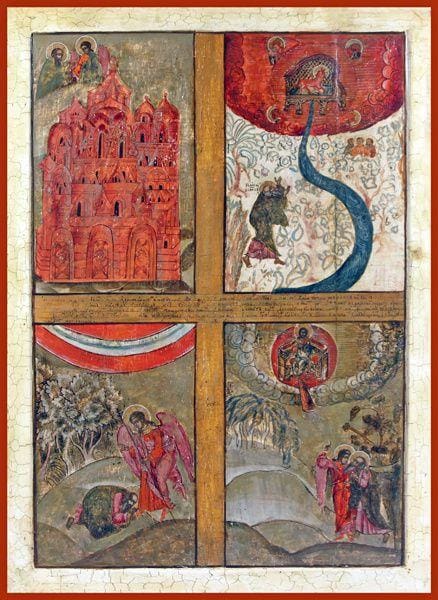
Protopresbyter George Grabbe (later Bishop Gregory), the long-time canonologist of ROCOR wrote, “the so-called ‘theology of peace’ is, in essence, the chiliastic preaching of the Kingdom of God on earth, with the help of the planting of communist socialism”
The theologian of ROCOR and Professor at the Jordanville Seminary, Archbishop Averky of Syracuse (Taushev) in his work entitled THE APOCALYPSE: IN THE TEACHINGS OF ANCIENT CHRISTIANITY, basing himself upon Patristic sources says concerning Revelation 20:4:
“And I saw thrones, and they sat upon them, and judgment was given unto them: and I saw the souls of them that were beheaded for the witness of Jesus, and for the word of God, and which had not worshipped the beast, neither his image, neither had received his mark upon their foreheads or in their hands; and they lived and reigned with Christ a thousand years. This picture symbolically depicts the kingdom of the Christian faith after the overthrow of paganism. Those who have assumed judgment and sit on the thrones are all Christians who have attained salvation, for to them has been given the promise of the Kingdom and the glory of Christ (I Thess. 2:12). From this choir, the holy Seer of Mysteries singles out in particular “those that were beheaded for the witness of Jesus and for the Word of God,” that is, the holy martyrs. St. John says, “I saw the souls of them that were beheaded.” From this, it is clear that these saints who participate in the thousand-year reign of Christ are reigning with Christ and performing judgment not on earth but in heaven, for it speaks here only concerning their souls which are not yet united with their bodies. From these words, it is evident that the saints take part in the governing of the Church of Christ on earth, and therefore it is natural and proper to appeal to them with prayers, asking their intercession before Christ with Whom they reign.
”And they lived and reigned with Christ a thousand years.” Their “living” is of a moral and spiritual nature. The holy Seer of Mysteries calls this “the first resurrection” (verse 5), while further on he speaks of the second bodily resurrection. This reigning of the saints with Christ will continue until the final victory over the dark impious powers under Antichrist. Then the resurrection of bodies will occur, and the last frightful Judgment will begin when the souls of the saints will be reunited with their bodies and will reign with Christ forever. 20:5 But the rest of the dead lived not again until the thousand years were finished. This is the first resurrection.
“The expression “lived not again” means the dark and difficult condition of the souls of the impious sinners after bodily death. It continues “until the thousand years were finished.” As in many other places in Sacred Scripture, this particle “until” (in Greek eos) does not signify the continuation of an action only to a certain boundary; on the contrary, it is a complete denial of any limit (see, for example, Matt. 1:25). In other words, it means that the impious dead are denied forever the blessed life.
“20:6 Blessed and holy is he that hath part in the first resurrection: on such the second death hath no power, but they shall be priests of God and of Christ, and shall reign with Him a thousand years.
“From the Divine Scripture we know that there are two lives and two deaths: the first life is temporal and fleshly because of the transgression of the commandments, while the second is the eternal life promised to the saints for the keeping of the Divine commandments. Corresponding to these there are two kinds of death: one fleshly and temporal, and the other eternal as chastisement for sins, which is the fiery Gehenna” (St. Andrew, ch. 62). Consequently, it is understood that if here on earth one has lived in Christ Jesus and has come before Him after the first death (that is, bodily death) with fervent faith in Him and filled with His grace, then one has no need to fear the second death, that is, the fiery Gehenna.”
And again in the same work, Archbishop Averky states:
“One must be aware, however, that neither in its first nor in its second form can the teaching of Chiliasm be accepted by an Orthodox Christian for the following reasons:
1. According to the chiliast teaching, the resurrection of the dead will take place twice: the first, a thousand years before the end of the world—when only the righteous will be resurrected; and the second, at the very end of the world, when sinners also will be resurrected. However, Christ the Saviour clearly taught only one universal resurrection of the dead, when both the righteous and the sinners will be resurrected and all will receive their final recompense (John 6:39-40; Matt. 13:37- 43).
2. The Word of God speaks of only two comings of Christ in the world: the first in lowliness, when He came to redeem us; and the second in glory when He will appear to judge the living and the dead. Chiliasm introduces one more—a third coming of Christ a thousand years before the end of the world. The Word of God knows no such thing.
3. The Word of God teaches only of two kingdoms of Christ: the Kingdom of Grace which will continue until the end of the world (I Cor. 15:23-26), and the Kingdom of Glory which will begin after the Last Judgment and will have no end (Luke 1:33; II Peter 1:11). Chiliasm, however, allows yet a third, as it were, a middle kingdom of Christ, which will last only a thousand years.
4. The teaching of a sensual kingdom of Christ clearly contradicts the Word of God, according to which the Kingdom of God is not “food and drink” (Rom. 14:17); in the resurrection of the dead they do not marry nor are given in marriage (Matt. 22:30); the rites of the law of Moses had only a prefiguring significance and were forever done away with by the more perfect New Testament law (Acts 15:23-30; Rom. 6:14; Gal. 5:6; Heb. 10:1). Certain ancient teachers of the Church—Justin, Irenaeus, and Methodius—held Chiliasm only as a personal opinion. At the same time, there were those who decidedly rose up against it such as Caius the Presbyter of Rome, St. Dionysius of Alexandria, Origen, Eusebius of Caesarea, St. Basil the Great, St. Gregory the Theologian, St. Epiphanius, Blessed Jerome, and Blessed Augustine. To hold Chiliasm even as a private opinion was no longer permissible after the Church, at the Second Ecumenical Council in 381, condemned the teaching of the heretic Apollinarius concerning the thousand-year reign of Christ. At the same time this was confirmed by the introduction into the Symbol of Faith of the words “of His Kingdom there will be no end.” One must likewise know that the Apocalypse is a book that is profoundly mystical, and therefore to understand and interpret literally the prophecies contained in it—especially if such a literal understanding contradicts other passages of Sacred Scripture—is entirely opposed to the rules of hermeneutics. In such cases, it is correct to seek in perplexing passages a metaphorical or allegorical meaning.
“20:7-8 And when the thousand years are expired, Satan shall be loosed out of his prison, and shall go out to deceive the nations which are in the four quarters of the earth, Gog and Magog, to gather them together to battle: the number of whom is as the sand of the sea.
By the “loosing of Satan out of his prison” is to be understood the appearance of Antichrist before the end of the world.”
As True Orthodox Christians, we must hold to the teachings of the Ecumenical Councils and what the consensus of the Holy Fathers of the Church has always been. Therefore, it is totally unacceptable, especially after the Second Ecumenical Council, for an Orthodox Christian to believe in Chiliasm. Let us return to Archbishop Averky to summarily and conclusively state why it is especially necessary to flee from chiliasm in these evil times:
“In a few of its points–especially in the expectation of the blessed life in this world–such a frame of mind closely resembles the widespread heresy of the first centuries of Christianity called chiliasm. This is the expectation of a thousand-year (this worldly) reign of Christ on earth; therefore the modern manifestation of this heresy may be termed “neo-chiliasm.”
One should be aware and keep in mind that chiliasm was condemned by the Second Ecumenical Council in the year 381; and therefore to believe in it now in the twentieth century, even in part, is quite unforgivable. Besides which, this contemporary “neo-chiliasm” is far worse than the ancient chiliastic heresy in that at its basis indubitably lies a disbelief in the life of the age to come … and the passionate desire to attain blessedness here on earth, using all the improvements and achievements of the material progress of our times. This false teaching wreaks terrible harm, lulling to sleep the spiritual vigilance of the faithful and suggesting to them that the end of the world is far away (if in fact there will be an end), and therefore there is no particular need to watch and pray, to which Christ the Saviour constantly called His followers (cf. Matt. 26:41), since everything in the world is gradually getting better and better, spiritual progress keeping step with materialism. And the terrible phenomena which we observe at the present time are all temporary; all has happened before, and all will ultimately pass away, and an extraordinary flourishing of Christianity will replace it, in which, of course, the ecumenists will occupy the principal and most honored places.
Thus, everything is fine! It is not necessary to labor over oneself, and no spiritual struggle is required; the fasts may be abolished. Everything will get better all by itself until the ‘Kingdom’ (vasileia) of God is finally established on earth with universal earthly satisfaction and blessedness.
Brethren! Is it not clear where the ultimate source of this alluring false teaching is to be found? Who suggests all these thoughts to contemporary Christians with the purpose of overthrowing all of Christianity? As an infectious plague, as fire, must we fear this “neo-chiliasm” which is so profoundly contrary to the teaching of the Word of God, the teaching of the Holy Fathers, and all of the centuries-old teachings of our Holy Church, by which many, many thousands of the righteous have been saved.
Without spiritual struggle, there is not, and cannot be true Christianity! Therefore, our path does not lie with all the modern movements, nor with ecumenists, nor with the “neo-chiliasts. “
Our faith is the faith of the holy ascetics, the apostolic faith, the faith of the Fathers, the Orthodox Faith which hath made the whole world steadfast. This faith and only this faith will we firmly adhere to in these evil days in which we now live. Amen.”
(Sermons and Speeches, vol. III pp. 259-265, and appeared in Orthodox Life, vol. 31, No.2, pp. 23-25.)


